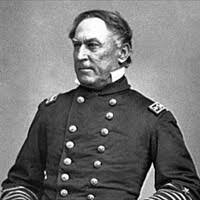It is an evening in early March, 1863. A Union gunboat stands snuggly anchored near the eastern shore of the Mississippi River. Technically it is still winter, but this is the state of Mississippi, and the evening air already holds the promise of spring.
The gunboat is about to embark on a journey upriver, but preparations are not yet complete, and as sailors throughout the vessel bustle about to finish them, two men are seated in a cabin, deeply immersed in what is plainly a very serious discussion. One of them, grizzled in appearance, looks to be about sixty years old. He wears the uniform of a Union rear admiral—he is in fact the first officer in American history to hold that rank, an honor bestowed by a grateful Congress after his brilliant and nearly bloodless capture of New Orleans, the most populous city in the rebel South.
The other man is strikingly handsome and clearly younger—about fifteen years younger, to be exact. He wears the uniform of a Union major general. His own combat record is the inverse of the admiral’s, its highlight being a humiliating defeat made worse by an adverse strategic sequel.
Each man is, of course, well aware of the other’s reputation. But the stark contrast means nothing. The only relevant fact is that the two men bear joint responsibility for an imminent, important military operation.
The older man happens to be David G. Farragut, who will one day be memorialized by an imposing statue in the center of Farragut Square in the nation’s capital. He is a career naval officer who has almost literally known no other life, having entered service as a midshipman at the age of nine.
The younger man is Nathaniel P. Banks, bereft of military service until the outbreak of the war, but with a political career behind him that, in terms of success, handily outstrips that of Farragut’s own pre-war career, which is so straightforward it’s scarcely worth mentioning.
But at age 32 Banks had won election as a representative in the Massachusetts state legislature. Just two years later he took up the gavel as Speaker of the Massachusetts House of Representatives. Two years more saw him win election as a representative to the U.S. Congress, and barely a year later, at age 40, through a combination of luck and skill, he became Speaker of the House, among the youngest Speakers in American history. He the won three terms as Governor of Massachusetts and easily won re-election three times. Then in 1860, at 44, he traded politics for a more lucrative career as resident director of the Illinois Central Railroad. A year later that career ended abruptly with the outbreak of the Civil War.
Banks almost immediately vaulted into the rank of major general of volunteers, an utterly bizarre development by present-day standards, but then few present-day standards applied to the early days of a crisis utterly unprecedented in American history. President Abraham Lincoln firmly believed that success depended upon strong public support for the Union cause, and a good way to ensure this was to make generals of men like Banks—in the case of Banks specifically to ensure the allegiance of the populous state of Massachusetts. His extensive political connections, acquired during the course of his meteoric political career, were a nice bonus.
There might have been a second reason to promote Banks. The Civil War was precisely that—a civil war—and as Union armies conquered Confederate territory their very success would require men equal to the problematic task of administering territory that must, after all, be restored to the Union, and that restoration was the entire point of the Union war effort. The complexity of this task should not be underestimated. A brilliant admiral like Farragut, although an expert at navigation at sea, would not have the slightest idea how to navigate the swirling political waters of wartime administration.
Banks, like Farragut, is now memorialized by an equally imposing statue in the heart of Boston. The statue memorializes his peacetime political career, of course, but with equal validity it could memorialize his service to the Union as military administrator, which in its own way would contribute as much to eventual Union victory as Farragut’s naval genius.
But the moment of that victory, as the two men confer about the impending operation, is unknowable. It may lie two years in the future, or five, or perhaps a whole decade. All they know is that the United States has been torn in two by a political disaster.
It was a political disaster that a few Americans had threatened it, or warned about it, for decades. But few really believed would actually happen, not even during the 1850’s, a decade that had seen a number of major crises centered on one basic question: was the American republic a free republic with pockets of slavery, or a slave republic with pockets of freedom?
Politicians showed themselves unable to resolve the question through the ordinary give-and-take of politics. A famous historian will one day dub them, collectively, as “the blundering generation.” Banks, strictly speaking, is a member of that generation. Certainly he saw much of the blundering at close range, thanks to his years in Congress.
Of one thing, however, both men are certain: the Union must be restored.
And as they uncork a bottle of champagne and share a glass or two, Farragut articulates the price to be paid if necessary.
“What matters it, General, whether you and I are killed or not? We came here to die. It is our business and must happen sooner or later. We must fight this thing out until there is no more than one man left and that man must be a Union man.” He briefly lifts his glass: “Here’s to his health.”

No comments:
Post a Comment
Note: Only a member of this blog may post a comment.